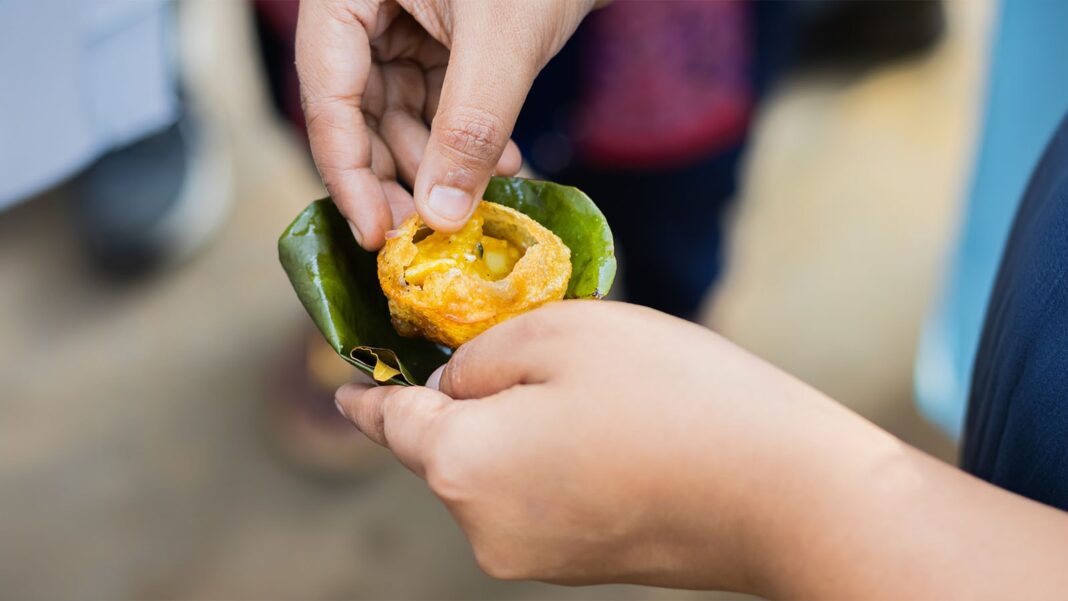FSSAI revealed that pani puri in Karnataka failed to pass the quality standards and contains artificial food colourings and cancer-causing agents.
Chole bhature, momos, kebabs, chaat, and let’s not forget gol gappa—these are some of the most popular street foods, but they are also unhealthy and unhygienic. Recently, the Food Safety and Standards Authority of India (FSSAI), Karnataka, issued a statement stating that pani puri contains cancer-causing agents and artificial food colouring, making it extremely unhealthy. According to a recent inspection, 22 percent of pani puri samples in the state did not meet safety standards. Out of the 260 samples collected, 41 contained artificial food colouring and carcinogenic substances that cause cancer. Additionally, 18 samples were deemed unfit for human consumption due to safety violations.
Furthermore, FSSAI identified harmful bacteria in Shawarma samples collected from 10 districts across the state. Many of these samples were found to be of poor quality and pose significant health risks to consumers.
Artificial food colours and cancer-causing agents found in pani puri
Following the Karnataka government’s recent ban on artificial food colouring used in various dishes across the state, including kebabs, fish, chicken, and vegetarian options, a concerning report on pani puri or gol gappe being unsafe has sparked concerns. FSSAI conducted inspections of Pani Puri across 79 locations in Karnataka, with 49 samples collected from different parts of Bengaluru, none of which met safety standards.
According to FSSAI, chemicals such as brilliant blue, sunset yellow, and tartrazine were identified as primary agents that failed safety standards for street foods. Health experts warn that excessive consumption of these chemicals can lead to various health issues, including stomach aches, heart disease, autoimmune disorders, and cancer.
Cancer-causing chemicals found in pani puri
While most food dyes do not cause any adverse effects, some artificial food colours have been linked to an increased risk of cancer. A study published by Food Chemistry Advances has indicated that certain dyes, such as Red 40, Yellow 5 and Yellow 6, may contain carcinogenic contaminants that could potentially contribute to cancer growth over time. Benzedrine, 4-aminobiphenyl and 4-aminoazobenzene are some other cancer-causing agents that have been found in food dyes.

Additionally, Dr Patil says, “There are various ingredients that go into the preparation of Pani Puri, a street food, some of which can contain aflatoxins. Aflatoxins may react as a carcinogen, a chemical that increases the risk of cancer.”
Side effects of artificial colours
Artificial food colours are synthetic additives used to enhance or alter the appearance of food products. They are commonly added to foods and beverages to get the desired colour and to compensate for natural colour loss during processing. These additives are typically labeled as food colourants or food dyes on ingredient lists and can be found in a wide range of products, from candies and sodas to baked goods and processed meats. According to a study published in Alternative Therapies in Health and Medicine, the use of food dyes and artificial food colour has increased by 500 percent in the last 50 years.
Despite their widespread use, artificial food colors have been a topic of concern due to their potential health effects. Here are some of the commonly known side effects of artificial food colors:
1. Digestive discomfort
According to a study published by the Archives of Medical Science, food dyes can cause inflammation in the intestine, leading to digestive problems such as nausea, vomiting, and diarrhea in certain people. While the same study found no link between food additives and inflammatory bowel diseases (IBD).
2. Allergic reaction
Chemicals such as Sunset Yellow and Tartrazine were identified as primary agents that may cause allergic reactions, as per a study published by Food Chemistry Advances. Due to these chemicals found in artificial food colouring, some people may develop skin rashes, itching, swelling, and in severe cases, respiratory problems,” explains Nutritionist Dr Rohini Patil.
Select Topics of your interest and let us customize your feed.

3. Impact on overall health
Besides gastrointestinal and allergic reactions, there can be other long-term effects caused by excessive consumption of artificial food colors. Dr Patil says, “Certain artificial food colours, particularly in children, may contribute to hyperactive behavior and behavioural disorder symptoms.” A study published by Neurotherapeutics also supported this fact.
Why should you avoid street foods during monsoon?
During the monsoon season, consuming street foods poses several health risks due to increased chances of contamination. Here are some reasons why it is advisable to avoid street foods during this time:
1. Sensitive immunity
During the monsoon season, there are constant cases of waterborne diseases and infections as a result of polluted water and food. This can weaken your immune system, making you vulnerable to the harmful effects of additives used in the preparation of street foods such as pani puri.
Also read: 5 vegetables to boost immunity and keep monsoon diseases at bay
2. Waterborne diseases
Heavy rains can lead to flooding and contamination of water sources used for cooking, cleaning, or washing utensils by street vendors. “Waterborne diseases such as cholera, typhoid, and hepatitis A can spread through contaminated food and water,” explains Dr Patil.
3. Spoilage
The high humidity and temperature fluctuations during monsoon can accelerate food spoilage. Street food ingredients such as dairy products, meat, and sauces are prone to spoil quickly if not stored properly. Consuming spoiled food can lead to food poisoning symptoms such as nausea, diarrhoea, and dehydration. So, it is better to avoid it.

4. Hygiene concerns
Street food vendors may face challenges in maintaining adequate hygiene standards during the monsoon due to muddy conditions, waterlogging, and rain. Dr Patil says, “Lack of proper handwashing, clean utensils, and protective food storage can further contribute to food contamination, increasing the risk of foodborne illnesses.”
So, avoid street foods, especially during monsoon season.








